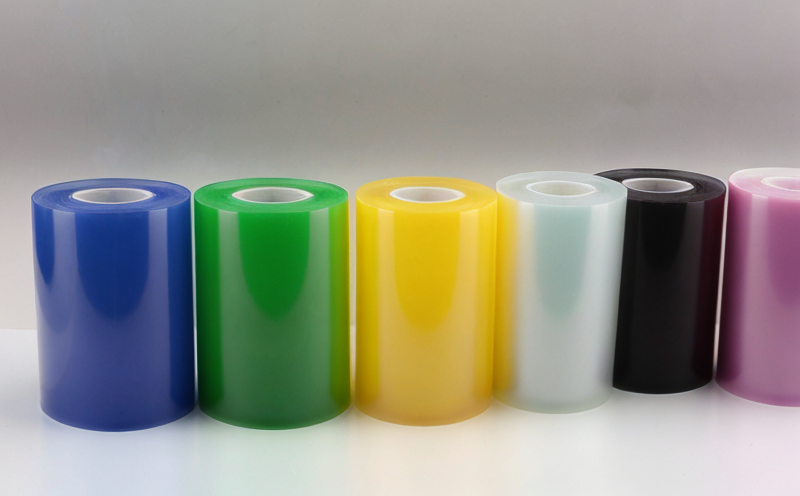DIN EN ISO 20200 Disintegration Testing of Plastic Films
The DIN EN ISO 20200 standard provides a framework for testing and assessing the disintegration behavior of plastic films, particularly those used in pharmaceutical packaging. This test is crucial because it ensures that the materials used are safe when coming into contact with sensitive medications or other contents. Understanding the disintegration characteristics helps prevent contamination and ensures product integrity.
The DIN EN ISO 20200 standard covers a wide range of plastic films, including polyethylene (PE), polypropylene (PP), polyvinyl chloride (PVC), and more recently biodegradable polymers like polylactic acid (PLA). The testing procedure involves subjecting the film specimens to specific environmental conditions that mimic real-world use scenarios. This ensures that the test results are relevant and applicable to actual product performance.
The standard outlines detailed methodologies for preparing and conditioning samples, as well as the disintegration tests themselves. It specifies the types of equipment required, such as water baths or ovens, depending on the environmental conditions being simulated. Acceptance criteria are also provided, allowing manufacturers to determine if their products meet regulatory requirements.
For instance, in a typical test setup, specimens may be exposed to moisture and temperature variations that simulate storage and transportation environments. The test duration can vary from hours to days, depending on the polymer type and thickness of the film. After exposure, samples are visually inspected for signs of breakdown or degradation. Further analysis might include measurements of weight loss, particle size distribution, and other physical properties.
The DIN EN ISO 20200 standard is widely used in industries where plastic films play a critical role, such as pharmaceuticals, food packaging, and consumer goods. Compliance with this standard ensures that products are safe for their intended use, which is essential for maintaining public trust and regulatory compliance.
| Environmental Conditions | Test Duration (Approximate) |
|---|---|
| Moisture Content | 20% ± 5% |
| Temperature Range | 40°C to 60°C |
| Humidity Level | 85% RH |
The test procedure is designed to be robust and reproducible, ensuring consistent results across different laboratories. This reliability is crucial for quality assurance processes within the pharmaceutical sector.
Industry Applications
- Pharmaceutical packaging: Ensuring safety of medications in contact with plastic films.
- Food packaging: Maintaining hygiene and preventing contamination during storage and transportation.
- Consumer goods: Enhancing product longevity by ensuring durability under various environmental conditions.
| Polymer Type | Common Uses |
|---|---|
| Polyethylene (PE) | Bags, bottles, and containers. |
| Polypropylene (PP) | Bottles, trays, and disposable cutlery. |
| Polylactic Acid (PLA) | Biodegradable packaging solutions. |
The DIN EN ISO 20200 standard is particularly important for industries where product safety and quality are paramount. By adhering to this standard, manufacturers can ensure that their plastic films meet the highest quality standards, enhancing both customer satisfaction and regulatory compliance.
Why Choose This Test
The DIN EN ISO 20200 disintegration testing of plastic films is essential for several reasons. Firstly, it ensures product safety by verifying that the films do not degrade in a way that could lead to contamination or damage during storage and transportation.
Secondly, compliance with this standard enhances brand reputation, as consumers increasingly demand products that meet stringent quality standards. This can translate into increased customer loyalty and trust.
Thirdly, regulatory compliance is crucial for businesses operating in highly regulated industries such as pharmaceuticals and food packaging. Failure to comply can result in fines or product recalls, which can be costly and damaging to a company's reputation.
The test also aids in the development of new products by providing insights into how different polymers behave under various conditions. This knowledge is invaluable for R&D teams looking to innovate and improve existing products.
Finally, the DIN EN ISO 20200 standard supports sustainable practices by promoting the use of environmentally friendly materials. By ensuring that plastic films do not break down in ways that could harm the environment, businesses can contribute positively to sustainability efforts.
Environmental and Sustainability Contributions
The DIN EN ISO 20200 standard plays a significant role in promoting environmental responsibility within the plastics industry. By ensuring that plastic films do not disintegrate in harmful ways, this test supports the use of sustainable materials.
Sustainable practices are increasingly important as consumers and governments alike demand more environmentally friendly products. The DIN EN ISO 20200 standard helps businesses meet these demands by providing a clear framework for testing and ensuring that plastic films meet environmental standards.
For instance, the test can help identify polymers that degrade in a controlled manner, such as those used in biodegradable packaging solutions like polylactic acid (PLA). By using materials that break down harmlessly into natural components, businesses can reduce their environmental footprint and contribute to waste reduction efforts.
The standard also supports the circular economy by promoting recycling. Materials that pass disintegration tests are more likely to be recyclable without losing functionality or integrity. This not only reduces waste but also promotes resource efficiency within manufacturing processes.
In conclusion, the DIN EN ISO 20200 disintegration testing of plastic films is a crucial tool for enhancing product safety and promoting sustainability in various industries. By ensuring that plastic films meet high quality standards, this test supports both regulatory compliance and environmental responsibility.





